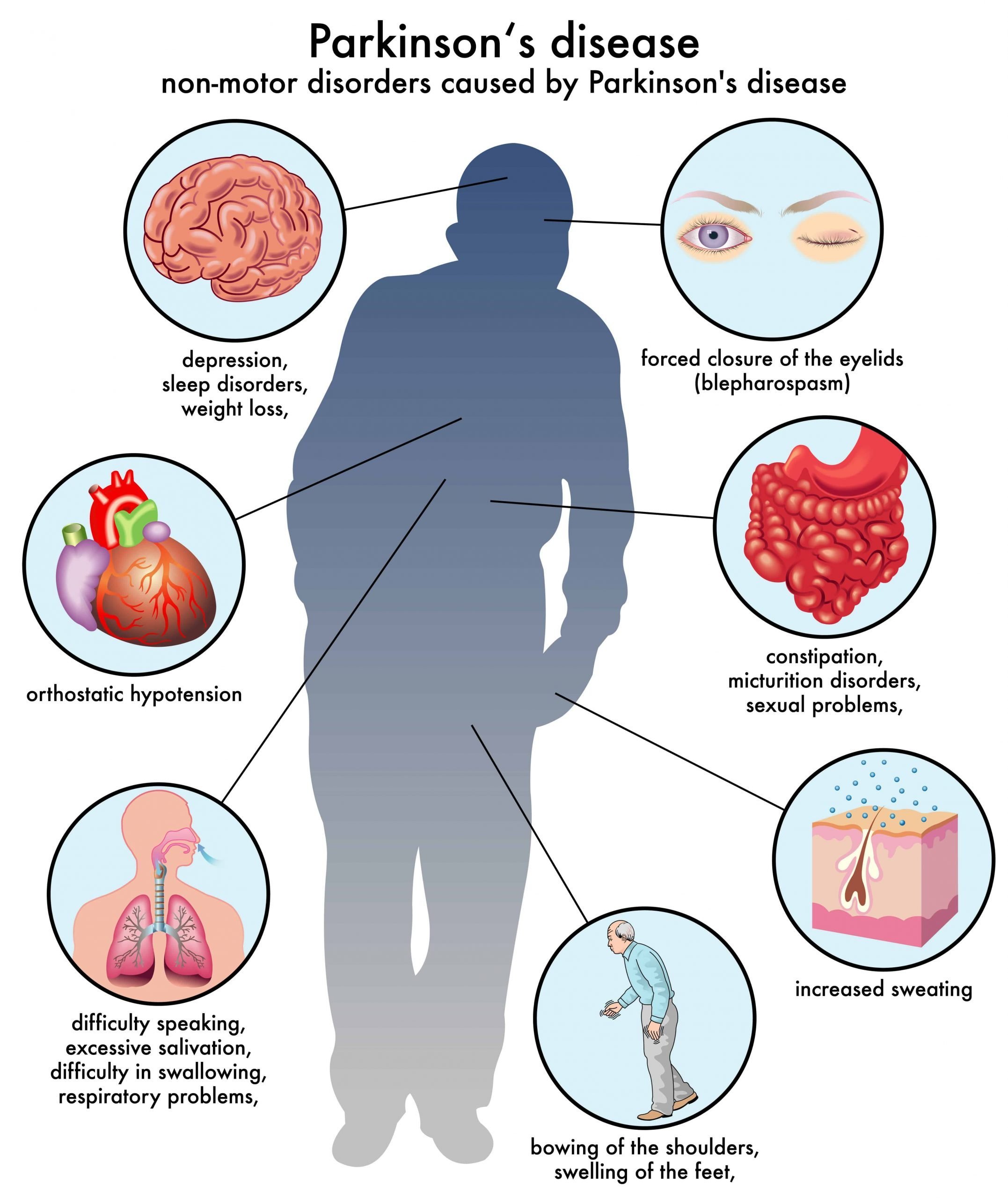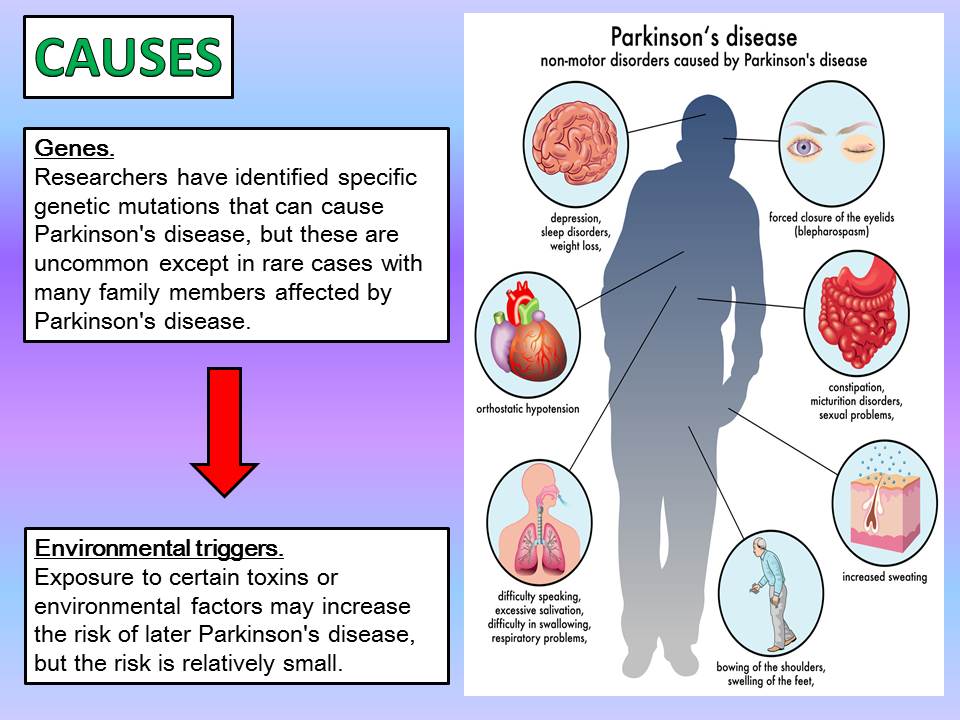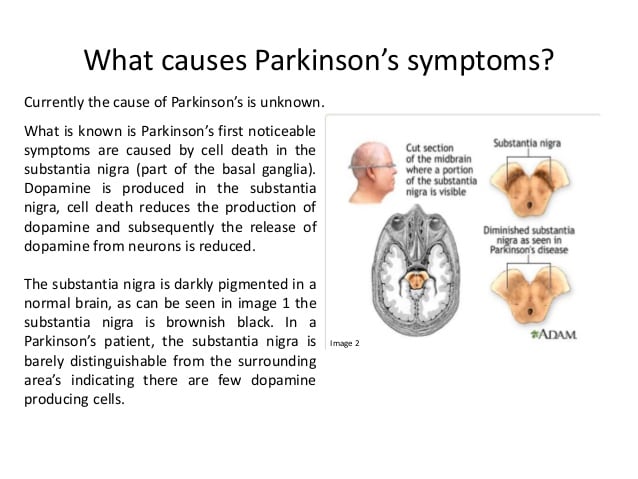Locating The Basal Ganglia
|
The basal ganglia are collections of nerve cells located deep within the brain. They include the following:
The basal ganglia help initiate and smooth out muscle movements, suppress involuntary movements, and coordinate changes in posture. |
Age And Genetic Factors Are Not Everything
The rate of Parkinsons disease globally has exceeded far faster than the population has aged according to the American Parkinson Disease Association.
Cases of the disease are up by several multiples over the past decades. From 1990 to 2015, the cases of the disease globally more than doubled, suggesting that there is far more at work. From 2015 to 2040, cases are expected to double once again. This is far higher than the rate of aging in the population.
What Else Do We Know
As scientists try to learn what’s at the root of Parkinson’s, they’re looking far and wide to pick up clues where they can.
They’ve found that people with Parkinson’s tend to have something called Lewy bodies in their brain. These are unusual clumps of a protein called alpha-synuclein. The protein itself is normal, but the clumps are not. And they’re found in parts of the brain that affect sleep and sense of smell, which could explain some symptoms of Parkinson’s not related to movement.
Your gut may also have a part in it, as some of its cells make dopamine, too. Some doctors think that this might be where the earliest signs of Parkinson’s show up, but that idea needs more research.
Show Sources
Read Also: Cleveland Clinic Parkinson’s Center Of Excellence
How Does Environment Come Into It
Your environment is a hard one to pin down. Partly, that’s because it covers a lot of ground. It’s everything that’s not your genes, which could mean where you live, what you eat, chemicals you’ve come into contact with, and more.
Not only that, but it could take years for the effects from something in your environment to show up. So far, doctors have a lot of clues but no smoking gun. So you could have people who live or work in an area around chemicals tied to Parkinson’s, but many of them don’t get it.
Some research shows links between Parkinson’s and:
- Agent Orange, a chemical used to destroy trees and crops in the Vietnam War.
- Certain chemicals used in farming, such as insecticides, herbicides, and fungicides.
- Some metals and chemicals used in factories, such as manganese, lead, and trichlorethylene .
These can come into play based on where you live, what you do for work, or if you served in the military. Sometimes, these chemicals seep into well water, so that’s one more way they can affect you.
Causes Of Parkinsons Disease

There are a variety of potential interconnected causes of Parkinsons, ranging from genetic to environmental factors. According to the Parkinsons Foundation, approximately 10-15% of all diagnoses are genetic. While there are some commonalities in Parkinsons patients, each persons experience can be unique, making it challenging to diagnose and treat. A genetic component often indicates an increased likelihood of Parkinsons development, not necessarily a foregone conclusion.
You May Like: Young Onset Parkinson’s Life Expectancy
Potential Causes Of Parkinsons Disease
The causes of Parkinsons disease are still unknown, although there is some evidence for the role of genetics, environmental factors, or a combination of both. It is also possible that there may be more than one cause of the disease. Scientists generally believe that both genetics and environment interact to cause Parkinsons disease in most people who have it.
Currently, there is an enormous amount of research directed at producing more answers about what causes Parkinsons disease and how it might be prevented or cured. When physicians diagnose Parkinsons, they often describe it as idiopathic . This simply means that the cause of the disease is not known.
Basic Concepts Of The Mediterranean Diet
The components of a Mediterranean diet include:
- Eat mainlyplant-based foods, such as a variety of fruits and vegetables, along with whole grains, nuts, and legumes, including lentils, chickpeas, beans, and peas.
- Consume a small amount of low-fat protein, either chicken or fatty fish, such as salmon, albacore tuna, or mackerel, a few times per week.
- Limit red meat to a few times a month.
- Avoid salt and instead flavor your meals with spices and herbs.
- Drink red wine in moderation .
- Replace butter with a healthier fat like extra virgin olive oil.
- Limit dairy, including cream, milk, and ice cream.
Don’t Miss: Deep Brain Stimulation For Parkinson’s Disease Success Rate
Some Are Calling Parkinsons A Man
Researchers are rapidly coming to the viewpoint that a large number of Parkinsons cases are tied to toxins. These researchers are even reaching conclusions that environment outranks genetics as a cause of Parkinsons.
One 2020 book discussed an exhaustive study of 17,000 twin brothers to pinpoint the effects that environment could play. The researchers found that people exposed to certain environmental factors were more than twice as likely to develop Parkinsons.
How Is Parkinson’s Disease Managed
Your doctors will tailor your treatment based on your individual circumstances. You will manage your condition best if you have the support of a team, which may include a general practitioner, neurologist, physiotherapist, occupational therapist, psychologist, specialist nurse and dietitian.
While there is no cure for Parkinson’s disease, symptoms can be treated with a combination of the following.
Read Also: What Is Bradykinesia In Parkinson’s
How Is Parkinsons Disease Treated
There is no cure for Parkinsons disease. However, medications and other treatments can help relieve some of your symptoms. Exercise can help your Parkinsons symptoms significantly. In addition, physical therapy, occupational therapy and speech-language therapy can help with walking and balance problems, eating and swallowing challenges and speech problems. Surgery is an option for some patients.
Diet And Exercise May Play Key Roles
Parkinson’s disease results from the death of dopamine-producing nerve cells within an area of the brain called the substantia nigra.
Since dopamine regulates movement, depletion of it results in motor symptoms like shaking, stiffness, and walking problems. Non-motor symptoms, like depression, sleep problems, and loss of smell, also commonly occur.
While there is no definitive way yet to prevent Parkinson’s disease, eating a “brain-healthy” diet and incorporating physical activity into your daily routine might help reduce the risk or delay symptom onset. This article reviews the potential roles of diet and exercise in PD prevention.
Read Also: Parkinson’s And Jaw Problems
How Do I Prevent Falls From Common Hazards
- Floors: Remove all loose wires, cords, and throw rugs. Minimize clutter. Make sure rugs are anchored and smooth. Keep furniture in its usual place.
- Bathroom: Install grab bars and non-skid tape in the tub or shower. Use non-skid bath mats on the floor or install wall-to-wall carpeting.
- Lighting: Make sure halls, stairways, and entrances are well-lit. Install a night light in your bathroom or hallway and staircase. Turn lights on if you get up in the middle of the night. Make sure lamps or light switches are within reach of the bed if you have to get up during the night.
- Kitchen: Install non-skid rubber mats near the sink and stove. Clean spills immediately.
- Stairs: Make sure treads, rails, and rugs are secure. Install a rail on both sides of the stairs. If stairs are a threat, it might be helpful to arrange most of your activities on the lower level to reduce the number of times you must climb the stairs.
- Entrances and doorways: Install metal handles on the walls adjacent to the doorknobs of all doors to make it more secure as you travel through the doorway.
What Is The Outlook For Persons With Parkinsons Disease

Although there is no cure or absolute evidence of ways to prevent Parkinsons disease, scientists are working hard to learn more about the disease and find innovative ways to better manage it, prevent it from progressing and ultimately curing it.
Currently, you and your healthcare teams efforts are focused on medical management of your symptoms along with general health and lifestyle improvement recommendations . By identifying individual symptoms and adjusting the course of action based on changes in symptoms, most people with Parkinsons disease can live fulfilling lives.
The future is hopeful. Some of the research underway includes:
- Using stem cells to produce new neurons, which would produce dopamine.
- Producing a dopamine-producing enzyme that is delivered to a gene in the brain that controls movement.
- Using a naturally occurring human protein glial cell-line derived neurotrophic factor, GDNF to protect dopamine-releasing nerve cells.
Many other investigations are underway too. Much has been learned, much progress has been made and additional discoveries are likely to come.
Recommended Reading: Rigidity In Parkinson’s Disease
How Can I Cope Better With Having Parkinsons Disease
One of the most important things you can do when you feel your Parkinsons is becoming unmanageable is seek help from your healthcare professional, who can provide you with strategies to strengthen your mental health and improve your quality of life. Parkinsons Queensland also has a range of helpful resources available that can assist with learning how to better manage Parkinsons disease.
Referral To A Specialist
If your GP suspects Parkinson’s disease, you’ll be referred to a specialist.
This will usually be:
- a neurologist, a specialist in conditions affecting the brain and nervous system
- a geriatrician, a specialist in problems affecting elderly people
The specialist will most likely ask you to perform a number of physical exercises so they can assess whether you have any problems with movement.
A diagnosis of Parkinson’s disease is likely if you have at least 2 of the 3 following symptoms:
- shaking or tremor in a part of your body that usually only occurs at rest
- slowness of movement
- muscle stiffness
If your symptoms improve after taking a medication called levodopa, it’s more likely you have Parkinson’s disease.
Special brain scans, such as a single photon emission computed tomography scan, may also be carried out in some cases to try to rule out other causes of your symptoms.
Recommended Reading: Can Parkinsons Be Reversed With Exercise
What Raises Someone’s Risk For Parkinson’s
It’s a complex picture, but you may be more likely to get Parkinson’s based on:
Age. Since it mostly affects people 60 and older, your risk goes up as the years go by.
Family history. If your parent, brother, or sister has it, you’re a little more likely to get it.
Job. Some types of work, like farming or factory jobs, can cause you to have contact with chemicals linked to Parkinson’s.
Race. It shows up more often in white people than other groups.
Serious head injury. If you hit your head hard enough to lose consciousness or forget things as a result of it, you may be more likely to get Parkinson’s later in life.
Gender. Men get it more than women. Doctors aren’t sure why.
Where you live. People in rural areas seem to get it more often, which may be tied to chemicals used in farming.
Southern Cross Medical Library
The purpose of the Southern Cross Medical Library is to provide information of a general nature to help you better understand certain medical conditions. Always seek specific medical advice for treatment appropriate to you. This information is not intended to relate specifically to insurance or healthcare services provided by Southern Cross. For more articles go to the Medical Library index page.
Don’t Miss: Parkinson’s And Bad Taste In Mouth
What Is Parkinson’s Disease
Parkinsons disease occurs when brain cells that make dopamine, a chemical that coordinates movement, stop working or die. Because PD can cause tremor, slowness, stiffness, and walking and balance problems, it is called a movement disorder. But constipation, depression, memory problems and other non-movement symptoms also can be part of Parkinsons. PD is a lifelong and progressive disease, which means that symptoms slowly worsen over time.
The experience of living with Parkinson’s over the course of a lifetime is unique to each person. As symptoms and progression vary from person to person, neither you nor your doctor can predict which symptoms you will get, when you will get them or how severe they will be. Even though broad paths of similarity are observed among individuals with PD as the disease progresses, there is no guarantee you will experience what you see in others.
Estimates suggest that Parkinsons affects nearly 1 million people in the United States and more than 6 million people worldwide.
For an in-depth guide to navigating Parkinsons disease and living well as the disease progresses, check out our Parkinsons 360 toolkit.
What Is Parkinson’s Disease?
Dr. Rachel Dolhun, a movement disorder specialist and vice president of medical communications at The Michael J. Fox Foundation, breaks down the basics of Parkinson’s.
No One Definitive Cause Of Parkinsons
There are no biomarkers or objective screening tests that indicate one has Parkinsons. That said, medical experts have shown that a constellation of factors are linked to it.
Parkinsons causes are likely a blend of genetics and environmental or other unknown factors. About 10 to 20 percent of Parkinsons disease cases are linked to a genetic cause, says Ted Dawson, M.D., Ph.D., director of the Institute for Cell Engineering at Johns Hopkins. The types are either autosomal dominant or autosomal recessive .
But that leaves the majority of Parkinsons cases as idiopathic, which means unknown. We think its probably a combination of environmental exposure to toxins or pesticides and your genetic makeup, says Dawson.
Age. The biggest risk factor for developing Parkinsons is advancing age. The average age of onset is 60.
Gender. Men are more likely to develop Parkinsons disease than women.
Genetics. Individuals with a parent or sibling who is affected have approximately two times the chance of developing Parkinsons. Theres been an enormous amount of new information about genetics and new genes identified over the past 10 or 15 years that have opened up a greater understanding of the disease, says Dawson.
Recommended Reading: Parkinson’s Disease Family Support
Surgery For People With Parkinsons Disease
Deep brain stimulation surgery is an option to treat Parkinsons disease symptoms, but it is not suitable for everyone. There are strict criteria and guidelines on who can be a candidate for surgery, and this is something that only your doctor and you can decide. Surgery may be considered early or late in the progression of Parkinsons. When performing deep-brain stimulation surgery, the surgeon places an electrode in the part of the brain most effected by Parkinsons disease. Electrical impulses are introduced to the brain, which has the effect of normalising the brains electrical activity reducing the symptoms of Parkinsons disease. The electrical impulse is introduced using a pacemaker-like device called a stimulator. Thalamotomy and pallidotomy are operations where the surgeon makes an incision on part of the brain. These surgeries aim to alleviate some forms of tremor or unusual movement, but they are rarely performed now.
How Is Parkinsons Disease Diagnosed

Diagnosing Parkinsons disease is sometimes difficult, since early symptoms can mimic other disorders and there are no specific blood or other laboratory tests to diagnose the disease. Imaging tests, such as CT or MRI scans, may be used to rule out other disorders that cause similar symptoms.
To diagnose Parkinsons disease, you will be asked about your medical history and family history of neurologic disorders as well as your current symptoms, medications and possible exposure to toxins. Your doctor will look for signs of tremor and muscle rigidity, watch you walk, check your posture and coordination and look for slowness of movement.
If you think you may have Parkinsons disease, you should probably see a neurologist, preferably a movement disorders-trained neurologist. The treatment decisions made early in the illness can affect the long-term success of the treatment.
Read Also: Hypothyroidism Misdiagnosed As Parkinson’s
Pesticide And Herbicide Exposure
A strong link has been shown between PD and exposure to pesticides and herbicides. We need more Parkinsons-specific research to better understand what causes PD and to work to prevent it and help eliminate the risk of getting the disease, when it comes to all environmental risk factors and whether genetics can cause an increased risk in developing Parkinsons.
One herbicide that has been linked to Parkinsons is paraquat, a widely used commercial herbicide in the U.S. that is banned in 32 countries, including the European Union and China. The Parkinsons Foundation, along with the Unified Parkinsons Advocacy Council, signed two letters to the U.S. Environmental Protection Agency encouraging them to cancel the registration of paraquat based on strong scientific research linking the herbicide to Parkinsons disease. In October 2020, the EPA re-approved paraquat for use in the U.S. Without additional action, paraquat will remain legal for sale and use in the U.S. for the next 15 years.
Can Parkinsons Disease Be Prevented
Unfortunately, no. Parkinsons disease is long-term disease that worsens over time. Although there is no way to prevent or cure the disease , medications may significantly relieve your symptoms. In some patients especially those with later-stage disease, surgery to improve symptoms may be an option.
Read Also: Caring For Someone With Parkinson’s
Diagnosis Of Parkinsons Disease
A number of disorders can cause symptoms similar to those of Parkinson’s disease. People with Parkinson’s-like symptoms that result from other causes are sometimes said to have parkinsonism. While these disorders initially may be misdiagnosed as Parkinson’s, certain medical tests, as well as response to drug treatment, may help to distinguish them from Parkinson’s. Since many other diseases have similar features but require different treatments, it is important to make an exact diagnosis as soon as possible.
There are currently no blood or laboratory tests to diagnose nongenetic cases of Parkinson’s disease. Diagnosis is based on a person’s medical history and a neurological examination. Improvement after initiating medication is another important hallmark of Parkinson’s disease.